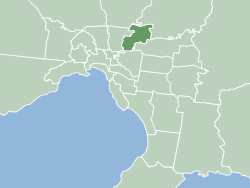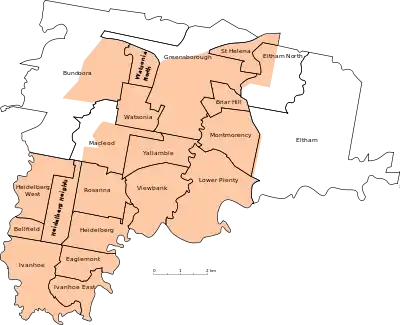| City of Banyule Victoria | |||||||||||||||
|---|---|---|---|---|---|---|---|---|---|---|---|---|---|---|---|
 Map of Melbourne showing Banyule | |||||||||||||||
| Population | 130,237 (2018)[1] | ||||||||||||||
| • Density | 2,067/km2 (5,350/sq mi) | ||||||||||||||
| Established | 1994 | ||||||||||||||
| Area | 63 km2 (24.3 sq mi)[1] | ||||||||||||||
| Mayor | Tom Melican | ||||||||||||||
| Council seat | Greensborough | ||||||||||||||
| Region | Greater Melbourne | ||||||||||||||
| State electorate(s) | |||||||||||||||
| Federal division(s) | Jagajaga | ||||||||||||||
 | |||||||||||||||
| Website | City of Banyule | ||||||||||||||
| |||||||||||||||
The City of Banyule is a local government area in Victoria, Australia in the north-eastern suburbs of Melbourne. It was created under the Local Government Act 1989 and established in 1994 as an amalgamation of former councils.[2][3] It has an area of 63 square kilometres (24.3 sq mi) and lies between 7 and 21 km from central Melbourne. In 1994 it had a population of 116,000.[4] In June 2018 Banyule had a population of 130,237.[1] The Yarra River runs along the City's southern border while its western border is defined by Darebin Creek.
The City moved their main offices from Ivanhoe to Greensborough in 2017.[5][6] A brand-new civic centre was constructed, including three-level offices to accommodate 320 council staff, community and function rooms.[7]
History
The area was originally occupied by the Wurundjeri, Indigenous Australians of the Kulin nation, who spoke variations of the Woiwurrung language group.
The City was named after the Indigenous Australian term Banyule or "Banyool", and was originally the name of a locality within the former City of Heidelberg before being adopted as the name of the new Council during the amalgamation of local government areas in Victoria. It was formed in December 1994 from the merger of the City of Heidelberg with parts of the Shires of Diamond Valley and Eltham.
The City also has some significant heritage within its boundaries. Significant buildings listed on the Victorian Heritage Register include:
- Charterisville (1840)[8]
- Banyule (1846)[9]
- Ravenswood (1891)[10]
- Chadwick House (1904)[11]
- Heidelberg Town Hall (1937)[12]
There are a number of housing estates[13][14] designed by leading early 20th Century architects Walter Burley Griffin and Marion Mahony Griffin and by property developer Albert Victor (A.V.) Jennings, some of the most significant art deco buildings in Melbourne, and the world's first Olympics athletes' village.
Banyule is the birthplace of the Heidelberg School of Art, which was formed when a group of artists, including Tom Roberts, Arthur Streeton, Frederick McCubbin, Walter Withers, Charles Conder and others moved to a shack on Mount Eagle (now known as Eaglemont) and began painting the landscape in a uniquely Australian way during the late 1880s.
Former councils
Former councils which formed part of Banyule council's current jurisdiction prior to their amalgamation include:[3]
- City of Heidelberg (all apart from the Bundoora Health precinct)
- Shire of Diamond Valley (all apart from the area north of Greensborough Highway, the Bundoora Health precinct and the eastern part of Eltham North)
- Shire of Eltham (suburbs of Montmorency and Lower Plenty only).
Wards and councillors

The current councillors of the City after the elections in October 2020 are:
| Ward | Party | Councillor[15] | Notes | |
|---|---|---|---|---|
| Bakewell | Independent[16] | Mark Di Pasquale | ||
| Beale | Independent | Elizabeth Nealy | ||
| Chelsworth | Greens[17] | Alida McKern | ||
| Griffin | Greens[18] | Peter Castaldo | ||
| Grimshaw | Independent[19] | Rick Garotti | Deputy Mayor | |
| Hawdon | Independent | Fiona Mitsinikos | ||
| Ibbott | Independent | Tom Melican | Mayor[20] | |
| Olympia | Independent | Peter Dimarelos | ||
| Sherbourne | Independent | Alison Champion | ||
Townships and localities
The 2021 census, the city had a population of 126,236 up from 121,865 in the 2016 census[21]
| Population | ||
|---|---|---|
| Locality | 2016 | 2021 |
| Bellfield | 1,793 | 1,996 |
| Briar Hill | 3,152 | 3,220 |
| Bundoora^ | 28,653 | 28,068 |
| Eaglemont | 3,873 | 3,960 |
| Eltham North^ | 6,805 | 6,830 |
| Greensborough^ | 20,821 | 21,070 |
| Heidelberg | 6,225 | 7,360 |
| Heidelberg Heights | 6,087 | 6,758 |
| Heidelberg West | 5,545 | 5,252 |
| Ivanhoe | 12,171 | 13,374 |
| Ivanhoe East | 3,815 | 3,762 |
| Lower Plenty | 3,891 | 3,962 |
| Macleod^ | 9,769 | 9,892 |
| Montmorency | 8,960 | 9,250 |
| Rosanna | 8,498 | 8,616 |
| St Helena | 2,923 | 2,890 |
| Viewbank | 6,923 | 7,030 |
| Watsonia | 5,214 | 5,352 |
| Watsonia North | 3,814 | 3,799 |
| Yallambie | 4,117 | 4,161 |
^ - Territory divided with another LGA
Notable people
Facilities
Ivanhoe Library, Rosanna Library and Watsonia Library are operated by Yarra Plenty Regional Library. A mobile library service to West Heidelberg is also operated by Yarra Plenty Regional Library.
Heidelberg Historical Society is a varied group of people with a shared interest in understanding and preserving the history of Heidelberg and surrounding suburbs.[22]
Warringal Conservation Society is a community group which advocates for the green spaces of Banyule and beyond.[23]
U3A Banyule provides learning opportunities especially for people of 50 years and older.[24]
See also
References
- 1 2 3 "3218.0 – Regional Population Growth, Australia, 2017-18: Population Estimates by Local Government Area (ASGS 2018), 2017 to 2018". Australian Bureau of Statistics. Australian Bureau of Statistics. 27 March 2019. Retrieved 25 October 2019. Estimated resident population, 30 June 2018.
- ↑ "Victoria Government Gazette online archive 1836-1997". Victoria Government Gazette S97. 15 December 1994. Retrieved 14 May 2019.
- 1 2 "Banyule City". Municipal Restructure Bulletin. 5: 3. January 1995.
- ↑ "City of Banyule". Municipal Restructure Bulletin. 5: 3. January 1995.
- ↑ "Council meetings". www.banyule.vic.gov.au. Retrieved 1 June 2021.
- ↑ "Banyule Council has finally moved into its 'Taj Mahal' head office". banyule.vic.gov.au. 25 April 2017. Retrieved 9 July 2017.
- ↑ "Civic centre to provide economic boost". www.pta.com.au. Retrieved 1 June 2021.
- ↑ "Victorian Heritage Database". vhd.heritagecouncil.vic.gov.au. 6 May 1999. Retrieved 18 May 2020.
- ↑ "Victorian Heritage Database". vhd.heritagecouncil.vic.gov.au. 2 July 2004. Retrieved 18 May 2020.
- ↑ "Victorian Heritage Database". vhd.heritagecouncil.vic.gov.au. 2 July 2004. Retrieved 18 May 2020.
- ↑ "Victorian Heritage Database". vhd.heritagecouncil.vic.gov.au. 6 May 1999. Retrieved 18 May 2020.
- ↑ "Victrian Heritage Database". vhd.heritagecouncil.vic.gov.au. 5 January 2006. Retrieved 18 May 2020.
- ↑ "Victorian Heritage Database". vhd.heritagecouncil.vic.gov.au. 5 January 2007. Retrieved 18 May 2020.
- ↑ "Victorian Heritage Database". vhd.heritagecouncil.vic.gov.au. 5 January 2007. Retrieved 18 May 2020.
- ↑ "Council election results". www.banyule.vic.gov.au. Retrieved 17 February 2021.
- ↑ readSeptember 12, Adrian Bernecich less than 2 min; Leader, 2013-12:00AMHeidelberg (11 September 2013). "Independent councillor joins Liberals". heraldsun. Retrieved 8 February 2021.
{{cite web}}: CS1 maint: numeric names: authors list (link) - ↑ "Alida McKern". Australian Greens Victoria. Retrieved 8 February 2021.
- ↑ "Tracking Victorian Crs who are members of a political party". The Mayne Report. Retrieved 23 June 2020.
- ↑ "Banyule Mayor quits ALP ahead of branch stacking hearing". www.abc.net.au. 8 February 2021. Retrieved 8 February 2021.
- ↑ "Councillor Tom Melican elected Mayor of Banyule Council". www.banyule.vic.gov.au. 13 November 2023. Retrieved 14 November 2023.
- ↑ "Census | Australian Bureau of Statistics". www.abs.gov.au. 11 January 2023.
- ↑ "Heidelberg Historical Society About Us". Heidelberg Historical Society. Retrieved 16 May 2019.
- ↑ "About Us Warringal Conservation Society". Warringal Conservation Society. 2019. Retrieved 16 May 2019.
- ↑ "U3A Banyule Inc Vic | Community Education". www.u3abanyule.org.au. Retrieved 1 June 2021.
External links
 Media related to City of Banyule at Wikimedia Commons
Media related to City of Banyule at Wikimedia Commons- Official website
- Yarra Plenty Regional Library
- Public Transport Victoria local public transport map
- Link to Land Victoria interactive maps Archived 24 March 2022 at the Wayback Machine